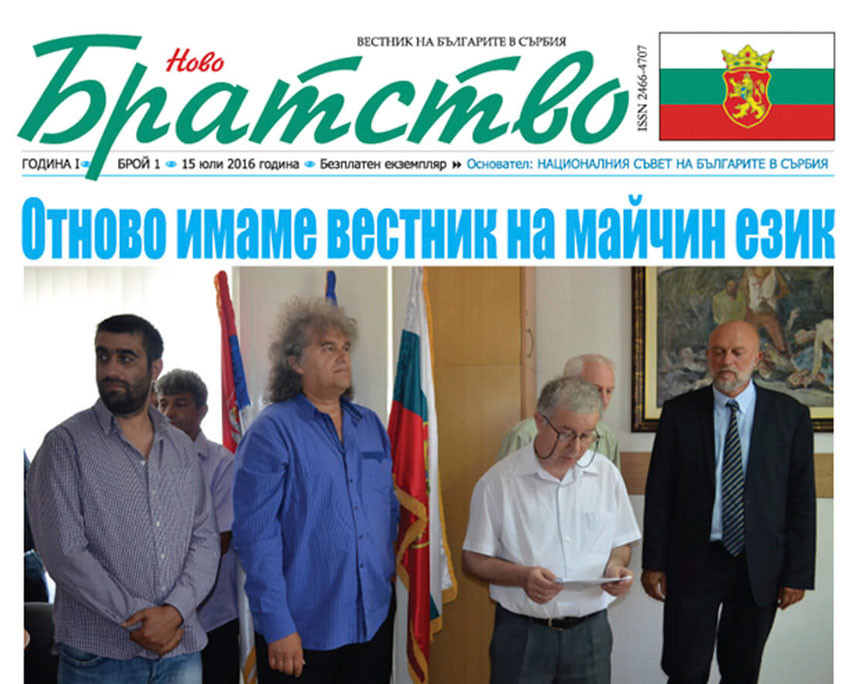Data from the Statistical Institute of Serbia from 2011 shows that a little over 18,000 people have identified themselves as Bulgarians in that country. The largest Bulgarian minority in Serbia is found in the eastern parts of Bulgaria’s western neighbour - mainly the municipalities of Bosilegrad and Tsaribrod. In recent years, due to the increasing economic migration, Bulgarians there have become less and less numerous, says Mila Vasov, director of the Novo Bratstvo (New Brotherhood) publishing house and editor-in-chief of the eponymous newspaper published in Bulgarian in the town of Niš.
"The newspaper has existed since 1949, and until two years ago it came out as a supplement to the Pirotska Svoboda (Pirot Freedom) newspaper and for about a year - as an independent Bulgarian newspaper entitled “Svoboda” (Freedom), i.e. we have existed since 1949 to the present day. There was an interruption in its publishing between 2012 and 2016. Initially, the newspaper was a weekly, and now, due to lack of funds, it is published every two weeks. One part of it is dedicated to life in the municipalities of Tsaribrod and Bosilegrad, and the other one to culture. We present the body of creative work of Bulgarians in Serbia. From 1960 to 2012 also the children's magazine "Drugarche" (Little Friend) was published, and from 1964 to 2012 - a large literary publication. Over the years, we have had a wealth of publishing activities funded by former Yugoslavia. During this time more than 150 books were printed in Bulgarian. Now we have the newspaper only."

Mila Vasov believes that the main role of the Bulgarian media in Serbia should be to unite all Bulgarians living there.
"The main characteristic of the Bulgarian minority here is that it is divided. We do not act as one organism. All the media call on us to work together in co-operation, but in practice we are divided. Why is that? There are a number of reasons…"
The region with Bulgarian population in neighbouring Serbia are defined in Bulgaria as "the western outlands" - a term established after the First World War and referring to the territories detached from the Bulgarian state and annexed to the Kingdom of Serbs, Croats and Slovenes under the Neuilly Peace Treaty signed on November 27, 1919. Most of these territories fall in Serbia and another part in present-day North Macedonia.
"In fact, about 18,000 Bulgarians live in Serbia. Currently, the education process in part of the primary schools in the western outlands is conducted in Bulgarian, in other places it is mixed. During socialism the education was entirely in Bulgarian, later children had the right to choose which language to study. However, after graduating, most of them continue their education in Sofia."
English Rossitsa Petcova
Photos: novo.bratstvo.rsThe cultural festival "Mysteries of Huhla 2024" is being held for the 26th consecutive time in the village of Huhla near the town of Ivaylovgrad. Until September 23, three ethnic groups—Bulgarians, Greeks and Turks—gather in the central square of..
Veliko Tarnovo hosts the 17 th International Festival of Military Brass Bands, the organizers from the Municipality of Veliko Tarnovo announced. This year, the festival will feature the Romanian Navy Military Band, the Guards Representative Brass..
Guests and residents of Sofia will have the opportunity to immerse themselves in the period of Late Antiquity and the reign of Emperor Constantius II, son of Constantine the Great. The reenactment is organized on September 21 and 22 by the Association..
Three anglers caught a giant catfish in Dyakovo dam near Dupnitsa. The fish could well enter the Guinness book of records, bTV reports. The men..
Circus, theatre, fire art, dance and youth workshops - all these arts are present at 6Fest. This is the first edition of the Street Arts Festival in..
The town of Sevlievo is famous for its pumpkins. The delicious fruit is grown in abundance in this part of northern Bulgaria. It is no coincidence..

+359 2 9336 661
